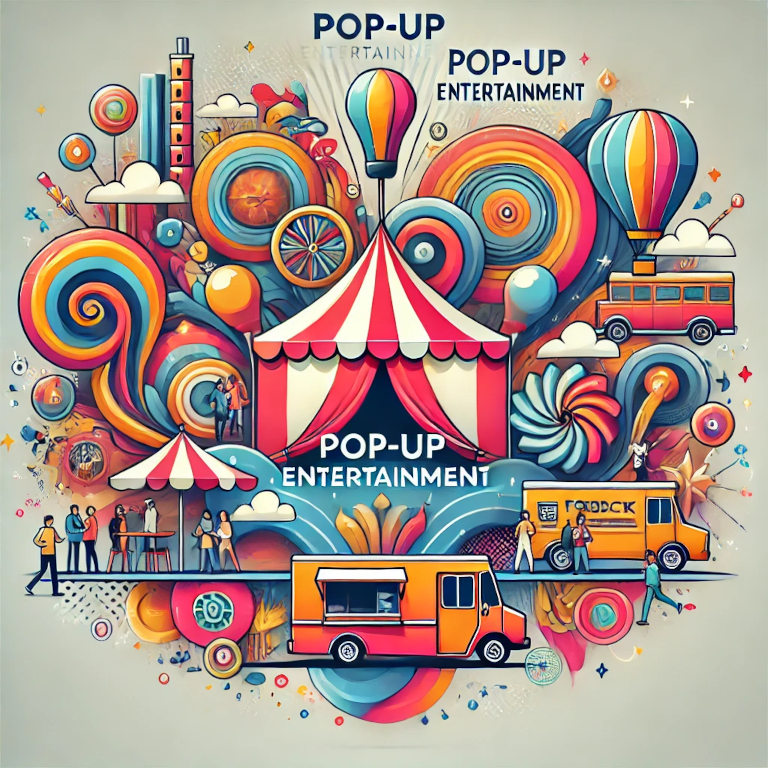Pop-up entertainment has become a popular and innovative way to engage audiences in unique and unexpected ways. These temporary, often surprise events offer immersive experiences that captivate and delight participants. As an expert in Entertainment, I will explore the concept of pop-up entertainment, its benefits, types, and how to create successful pop-up events. This article aims to provide valuable insights into the world of pop-up entertainment, helping you understand its impact and potential.
Understanding Pop-Up Entertainment
Pop-up entertainment refers to temporary events or installations that appear unexpectedly in various locations. These events are designed to be short-term, often lasting only a few hours to a few days, and aim to create a sense of urgency and excitement. Pop-up entertainment can take many forms, including performances, art installations, food festivals, and interactive experiences.
The Benefits of Pop-Up Entertainment
Pop-up entertainment offers numerous benefits for both organizers and participants:
1. Creating Buzz and Excitement
The temporary nature of pop-up events generates buzz and excitement, as people are eager to experience something new and unique before it disappears.
Benefits:
- Increased Engagement: The limited-time aspect encourages immediate participation.
- Viral Marketing: Pop-up events often generate social media buzz, increasing their reach and visibility.
2. Flexibility and Adaptability
Pop-up events can be easily adapted to different locations and audiences, allowing organizers to experiment with various concepts and formats.
Benefits:
- Location Variety: Events can be hosted in diverse locations, from urban settings to rural areas.
- Targeted Audiences: Organizers can tailor events to specific demographics or interests.
3. Cost-Effectiveness
Compared to permanent installations, pop-up events are often more cost-effective, requiring fewer resources and less long-term commitment.
Benefits:
- Lower Overheads: Reduced costs for venue rental, staffing, and maintenance.
- Testing Concepts: Ability to test new ideas and concepts without significant financial risk.
Types of Pop-Up Entertainment
Pop-up entertainment encompasses a wide range of formats and experiences. Here are some popular types:
1. Pop-Up Theaters
Temporary theaters can be set up in unconventional locations, offering unique and immersive performances. These can range from small-scale productions to elaborate shows.
Examples:
- Shakespeare in the Park: Outdoor theater performances in public parks.
- Site-Specific Performances: Plays or musicals staged in locations relevant to the story, such as historic buildings or urban spaces.
2. Pop-Up Art Installations
Artists create temporary installations that engage and inspire viewers. These can be interactive, thought-provoking, or simply visually stunning.
Examples:
- Street Art: Murals and installations in urban environments.
- Interactive Exhibits: Art pieces that encourage audience participation.
3. Pop-Up Food Festivals
Food festivals offer a chance to explore diverse culinary experiences in a temporary setting. These events can feature food trucks, local vendors, and themed dining experiences.
Examples:
- Food Truck Rallies: Gatherings of food trucks offering a variety of cuisines.
- Themed Pop-Up Restaurants: Temporary dining experiences with a specific theme or menu.
4. Pop-Up Markets
Temporary markets provide a platform for local artisans, designers, and small businesses to showcase and sell their products. These events often have a festive atmosphere.
Examples:
- Holiday Markets: Seasonal markets offering holiday-themed goods and gifts.
- Craft Fairs: Markets featuring handmade and artisanal products.
5. Pop-Up Interactive Experiences
Interactive pop-up events engage participants through hands-on activities and immersive environments. These can range from escape rooms to virtual reality experiences.
Examples:
- Escape Rooms: Temporary escape room installations with unique themes and puzzles.
- Virtual Reality Pop-Ups: VR experiences set up in public spaces for limited time periods.
Tips for Creating Successful Pop-Up Entertainment
To create a successful pop-up event, consider the following tips:
1. Choose the Right Location
Select a location that aligns with your event’s theme and target audience. High-traffic areas can help attract more participants.
Tips:
- Accessibility: Ensure the location is easily accessible for your target audience.
- Permits and Regulations: Obtain necessary permits and comply with local regulations.
2. Promote Your Event
Effective promotion is crucial for generating interest and attracting attendees. Use a mix of online and offline marketing strategies.
Tips:
- Social Media: Leverage social media platforms to create buzz and share updates.
- Collaborations: Partner with local influencers, businesses, or organizations to expand your reach.
3. Create a Memorable Experience
Focus on creating an engaging and memorable experience for attendees. Unique elements and interactive components can enhance the overall impact.
Tips:
- Interactive Activities: Include hands-on activities or interactive installations.
- Attention to Detail: Pay attention to details such as decor, lighting, and music to create the desired atmosphere.
4. Engage with Your Audience
Engage with attendees during and after the event to build a community and gather feedback. This can help improve future events and maintain interest.
Tips:
- Live Interaction: Interact with participants during the event through activities or Q&A sessions.
- Follow-Up: Send thank-you messages and gather feedback through surveys or social media.
Summary
Pop-up entertainment offers a dynamic and innovative approach to engaging audiences with temporary, immersive experiences. From pop-up theaters and art installations to food festivals and interactive experiences, these events create excitement, offer flexibility, and can be cost-effective. By choosing the right location, promoting effectively, creating memorable experiences, and engaging with your audience, you can ensure the success of your pop-up events. Embrace the spontaneity and creativity of pop-up entertainment to captivate and delight your audience.






